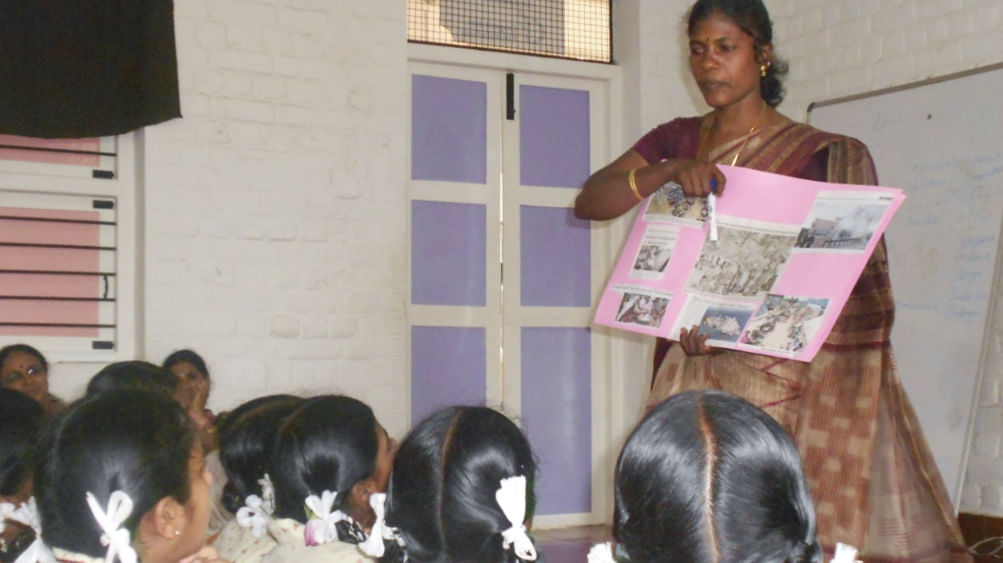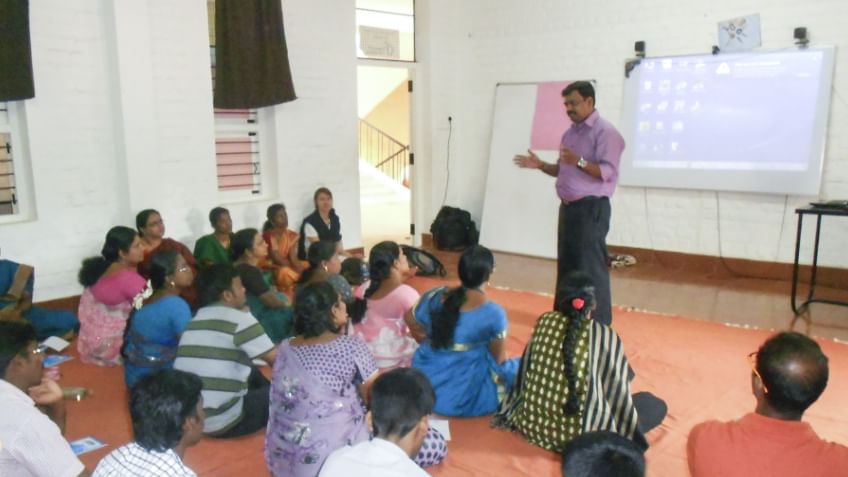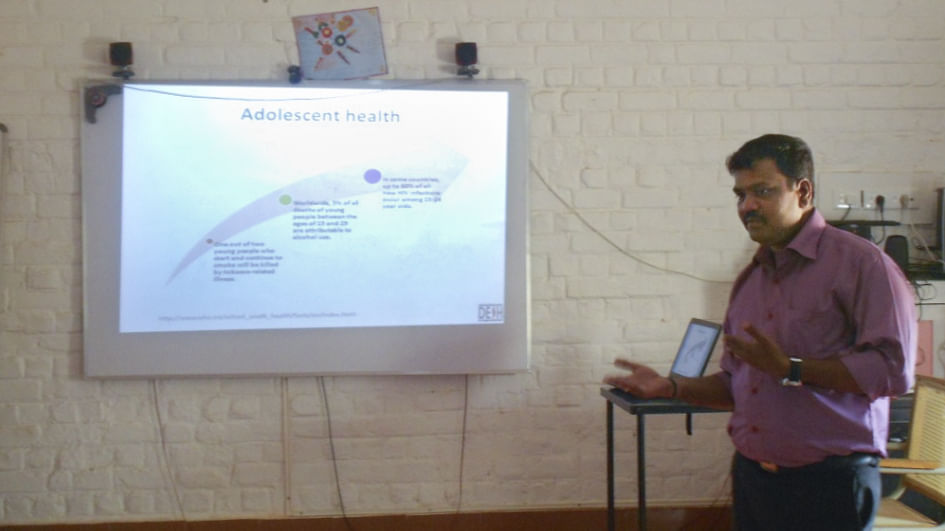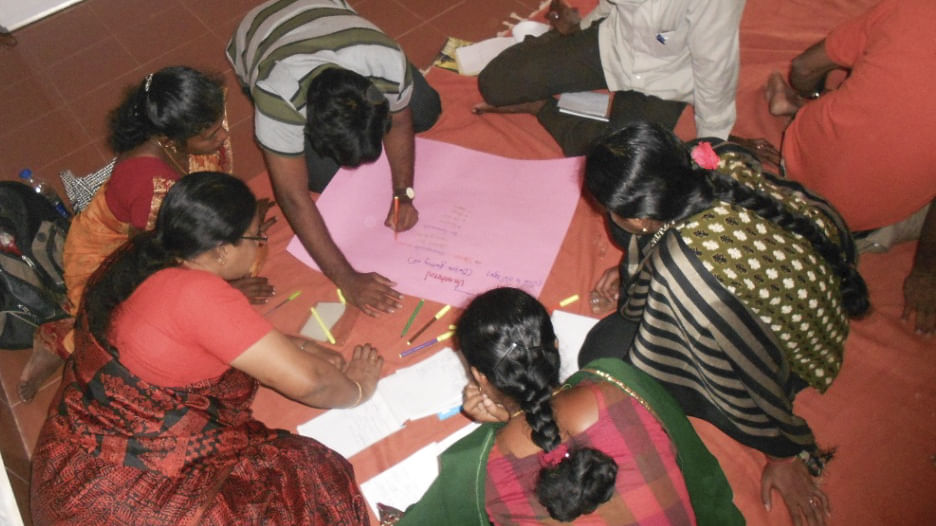Share
Isha Vidhya Teachers Get Some "Life Ed"
The Isha Way
13 May 2019
08:06 am
Teachers in a rural school often take on the part of a student’s guide and part-time guardian.

Rural education in India is about more than just the curriculum and textbook. Often, as in the case of Isha Vidhya schools, students are the first members in their family to receive any formal education. Financial situations often force parents – many of whom earn minimal wages – to work all day, leaving little time for family life. Children therefore, often resort to their own devices or the advice of peers while facing various situations in life. A comprehensive education in a rural setting has to account for all these factors, and teachers often take on the role of a guide and part-time guardian.
In March 2013, a batch of 24 Isha Vidhya teachers underwent training with DESH (Deepam Educational Society for Health), Chennai, on Life Skills Education, which will help them improve the quality of their students’ life. Key modules of the training included building students’ health awareness, adolescence, the dangers of tobacco and alcohol, reproductive health education, and dealing with peer pressure.
Diverse learning techniques such as role play, group activities, videos, games, and case studies were used in the training. Trainings for the teachers were conducted in the mornings, and afternoons were dedicated to mock sessions with the students. Handling these sessions gave teachers a good opportunity to correct their own mistakes and most importantly, shed their inhibitions in handling sensitive topics.
Health Education
Children’s health-related attitudes and practices can easily be molded and guided by their teachers. The training therefore covered several health-related issues:
- General health: What is health, factors influencing and affecting health, what is death, reasons for death.
- Disease: What is disease, types of diseases.
- Communicable and non-communicable diseases: Factors influencing communicable and non-communicable diseases.
- Maintenance of health records at school
Adolescence
Adolescence is a phase when individuals are vulnerable to negative peer pressure, risk-taking, experimentation, and misinformed decisions relating to their behavior and sexuality. It not only affects the development of adolescent children but also their family and society.
A significant gap exists between teenagers’ need for adolescence-related information, and its availability at the opportune time. This section of the training informed teachers about facts and methods to deal with the problems students face during this period.
Tobacco, alcohol, and drugs: Teachers were asked to list out the ill-effects of tobacco and alcohol, which enabled them to become aware of its negative consequences. They were also taught various methods to educate students on this subject.
Reproductive health education: Knowledge about reproductive health is important for the healthy behavior of adolescents. Reproductive health education includes information about anatomy and physiology, puberty, pregnancy and sexually transmitted infections, including HIV/AIDS. This information is essential for students to understand their body and its changes.
The teachers were then taken through various aspects of enabling students in making correct choices. These included topics like:
Decision-making: This helps students deal constructively with decisions about their lives. This can have positive consequences for student health when they actively make decisions about their own health practices by assessing different options and the effects of different decisions.
Self-esteem: Self-esteem refers to the value or the worth an individual attaches to him/herself. In this topic, the teacher is guided on ways of developing a student’s self-esteem.
Saying “No” to peer pressure: Adolescents can find it difficult to resist peer pressure. In this topic, the teachers were guided on ways to enable students to manage peer relationships and ways to say “NO” when the situation demands it.
Sensitizing teachers about child abuse was an important module of the training. Through video and role play, teachers learnt to teach children the difference between safe and unsafe touch, ways through which a child can avoid touch they are uncomfortable with, and raising an alarm.
After the training, flip charts, powerpoint presentations, videos, games, and training content were distributed to all the schools. The participating teachers felt that the training helped them shed their inhibitions and empowered them to talk about many sensitive issues among students.
Related Stories
Eliminating Punishment in School
13 May 2019
10:07 am
Spare the rod, spoil the child, they used to say, but corporal punishment can lead to physical injury and emotional trauma. So, at Isha Vidhya, teachers learn new methods of handling students and situations.
Summer School
02 Nov 2023
05:29 am
During the students' summer break, dedicated teachers at Isha Vidhya participated in professional development workshops to improve their teaching skills and enhance the learning experience for their students. This blog explores these workshops and showcases the teachers' enthusiastic responses to collaborative programs that have equipped them with the tools for delivering quality education.
Open Day at Isha Vidhya
03 Mar 2025
10:51 am
Isha Vidhya schools recently hosted an engaging Open Day event, offering parents and visitors an immersive look into their innovative educational approach. The event showcased school facilities and unique teaching methodologies through carefully planned demonstrations and student-led tours. What made this event special was the collaborative effort - from teachers creating presentation materials to bus drivers encouraging parent participation.
Keep In Touch
Get the latest updates on blog and happenings at Isha Vidhya and on the rest of Isha's social work — delivered to your inbox.




